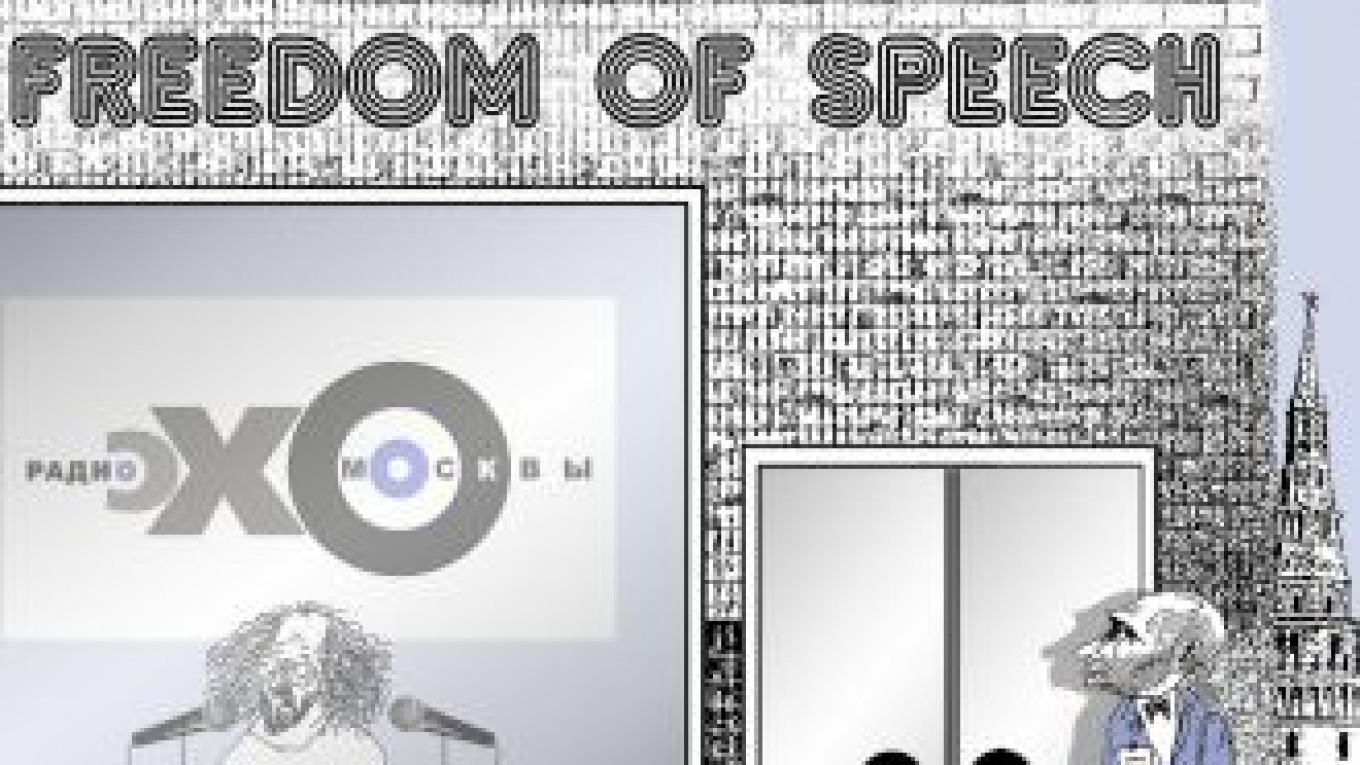For the past week, many Russians were worried about the fate of Ekho Moskvy radio. After two independent directors on the station's board of directors were replaced by the majority shareholder, Gazprom Media, two other directors from the editorial side, including the station's editor-in-chief, Alexei Venediktov, stepped down in protest. It is feared that Venediktov — the guarantor and symbol of the station's independence — will be replaced with someone who will turn Ekho Moskvy into a servile tool of the Kremlin.
There are two main heroes in this story. The first is Alexei Gromov, Putin's former press secretary and current presidential administration deputy chief of staff. The second is Mikhail Lesin, former press minister and a presidential aide.
The Gromov-Lesin tandem experienced a decline in influence during Medvedev's presidency. During that period, they were in a losing battle against forces linked to Natalya Timakova, Medvedev's strong-willed spokeswoman. In 2009, Timokova's team oversaw Lesin's dishonorable discharge from the Kremlin.
When the ruling tandem revealed at the United Russia convention on Sept. 24 that Putin planned to return to the presidency, the political weight of Medvedev's team, including Timakova, plummeted. That was when Gromov and Lesin began their comeback.
Apparently, this business tandem is trying to create a major media holding company based on Gazprom Media and the National Media Group, which is controlled by Putin's loyal colleague Yury Kovalchuk. If this plan pans out, Lesin will likely head the business side of the new holding company, while Gromov will head the administrative side.
Lesin and Gromov had to convince Putin and Gazprom, the parent company of Gazprom Media, that Gazprom Media is failing to manage Ekho Moskvy properly — including the station's editorial policies which, as Putin himself said in mid-January constantly pours verbal "diarrhea" over Putin.
The business case that Lesin and Gromov apparently made to Gazprom and Putin is that Gazprom should get rid of its noncore media holdings and hand them over to a reliable manager such as Lesin who can turn them into economic and political assets rather than liabilities.
? In any event, Ekho Moskvy's editorial independence, which Venediktov has fought fiercely to maintain for 20 years, is unlikely to surrender easily. Several years ago, Vladislav Surkov, who de facto oversaw the government's media holdings as first deputy chief of staff under President Medvedev, tried to replace Venediktov with Kremlin-friendly television host Vladimir Solovyov, but failed.
Contrary to popular opinion, Putin actually supports Ekho Moskvy radio under Venediktov's editorial rule.
Putin needs the popular station not only because commentators loyal to him — such as Leonid Radzikhovsky, Maxim Shevchenko, Alexander Prokhanov and others — have been given regular airtime on the station. In addition, the station offers a slew of commentators? who are heavily critical of Putin, like Yevgenia Albats, Viktor Shenderovich, Vladimir Ryzhkov and others.? Thus, the station is solid proof to the outside world that Russia respects freedom of speech.
Putin doesn't fear Ekho Moskvy because his largest constituency — the passive, inert majority — does not listen to the station. In addition, since Putin diminishes the importance and power of the "active minority" that listens to Ekho Moskvy, he will continue to allow the station's editorial policy to exist as it is.
Paradoxically, if a member of the active minority ever came to power, he would be more likely to intervene in the editorial policy of the station — for example, insisting that critics of the ruling regime be placed on a blacklist — because he understands that the active minority is much more powerful than its small numbers would indicate. In this sense, Putin is actually more liberal than the liberals.
Putin largely ignores this minority because he feels they are too small to make a difference. This could come back to haunt him in his next presidential term.
Stanislav Belkovsky is a political analyst and director of the Moscow-based National Strategy Institute.


